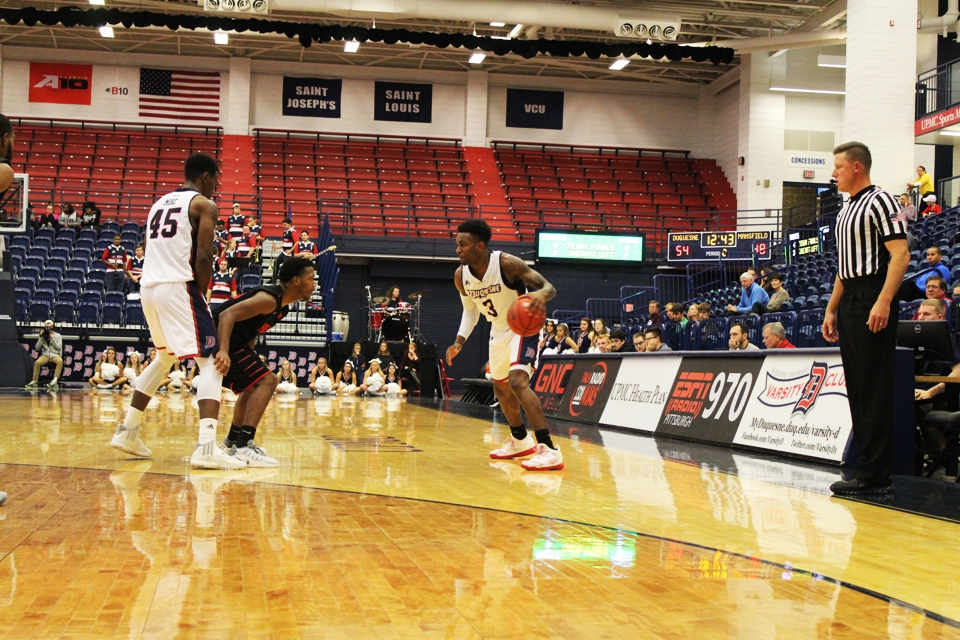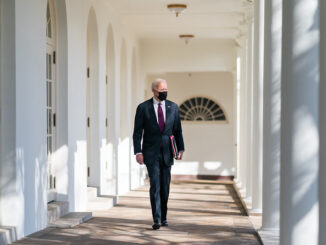
Female Duquesne students walk to class. Sexual assault is surprisingly common on college campuses. The National Sexual Violence Resource Center reported that one-in-five women are sexually assaulted while in college. 90 percent of victims never report it.

Female Duquesne students walk to class. Sexual assault is surprisingly common on college campuses. The National Sexual Violence Resource Center reported that one-in-five women are sexually assaulted while in college. 90 percent of victims never report it.
Kaye Burnet | Staff Writer
On Thursday, Sept. 7 Secretary of Education Betsy DeVos announced that the Department of Education will be reviewing guidelines established by the Obama administration under Title IX that influence how colleges and universities handle instances of sexual assault, rape, and sexual harassment. Although DeVos did not yet announce any significant policy changes, she has been critical of the current guidelines and how they handle the rights of accused students.
Few intersections of law and school policy are as potentially confusing for college students as Title IX, a section of the United States Education Amendments of 1972. Of the five students The Duke interviewed for this story, none knew what Title IX was, and only said she would be able to find Duquesne’s policy on sexual misconduct if asked.
“I have no idea what that is,” said Maria Gomez, a 4th-year pharmacy student, when asked about Title IX. “I’ve never heard Duquesne talk about it.”
When asked if she would know what to do if she or a friend were involved in a sexual harassment incident on campus, Gomez replied, “Probably not…I didn’t know [Duquesne] had a policy about that.”
“I probably wouldn’t know what to do,” admitted Brooke Pucci, a sophomore biology major.
Title IX, read “Title Nine,” prevents any college or university that accepts federal dollars from gender-based discrimination. This law is frequently discussed in regards to athletics because of its requirements that men and women have equal access to collegiate sports and that colleges issue proportional amounts of sports scholarship dollars to all genders. However, in the years since its inception, Title IX has been legally interpreted to give the Department of Education authority over how colleges adjudicate, or resolve, sexual assault accusations.
“The Department of Education Office for Civil Rights, which enforces Title IX, released guidance in 2011 through what’s called a ‘Dear Colleague Letter,’” explained Sean Weaver, Title IX coordinator at Duquesne. “It says that sexual harassment, which includes acts of sexual violence, is a form of sex discrimination prohibited by Title IX.”
Duquesne University’s Title IX procedures and policies regarding sexual misconduct and gender discrimination are called “TAP No. 31,” where “TAP” stands for “The Administration Policies.” The full text of TAP No. 31 can be found at www.duq.edu/titleix. This policy prohibits sexual harassment, gender-based harassment, sexual misconduct, sexual assault, sexual exploitation, stalking, dating violence, domestic violence, and retaliation against anyone filing a Title IX report.
“[In the event of a violation of TAP No. 31] complainants … have the option of filing a police report, as well as reporting to Duquesne’s Title IX Coordinator, a Deputy Title IX Coordinator, a Responsible Employee, as well as other resources on campus,” Weaver explained. “It is the policy of Duquesne University to provide an educational, employment, and business environment free of all forms of sex and/or gender-based discrimination, as further defined in TAP No. 31 and as otherwise prohibited by state and federal law. Multiple reporting options achieve this.”
According to a dossier compiled by United Educators, an insurance group for schools, “gender discrimination” as prohibited by Title IX was interpreted by the Supreme Court in 1986 to include any form of sexual harassment on campus. With subsequent court findings and the passage of more legislation, including the 1987 Civil Rights Restoration Act and the 1991 Clery Campus Crimes Act, “sexaul harassment” came to include more extreme forms of sexual violence, including rape and sexual assault. This culminated with the “Dear Colleague Letter” (DCL) from the Office for Civil Rights of the U.S. Department of Education. According to Weaver, this DCL provided guidelines that universities must follow to remain in compliance with Title IX when addressing sexual violence on campus.
Now under Title IX, colleges are responsible for creating learning environments free from any form of sexual violence. If sexual violence does occur, schools must respond promptly and follow a formal grievance procedure that includes a hearing and punishments as severe as probation or expulsion for the accused, according to Know Your IX, a student advocacy group. These school procedures can occur with or without an accompanying criminal investigation through traditional police avenues, and a student can be found guilty by their school even if they are found not guilty in a court of law.
The DCL is at the center of the current controversy over Title IX, and was directly addressed by DeVos in a Thursday speech at George Mason University.
“For too long, rather than engage the public on controversial issues, the Department’s Office for Civil Rights has issued letters from the desks of unelected and unaccountable political appointees… The era of “rule by letter” is over,” DeVos said.
According to Weaver, if the Department of Education changes its policies regarding sexual violence on college campuses, “Duquesne will maintain policies that are in keeping with its Mission and that comply with all Federal, State, and local laws.”



